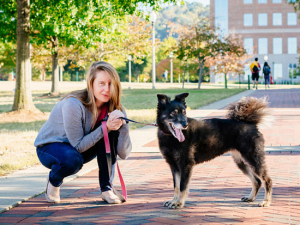Displaying items by tag: aging
This is a great opportunity for all to gain experience participating in a clinical research study. All participation would not only contribute to advancing our understanding of perceptual learning and how the brain processes vision, but also holds the potential to improve outcomes for those with central vision loss.
If you or someone you know may be interested, please consider participating.
For more information or to express interest, please email mcmaxwell@uabmc.edu or text or call 205-410-4041, or visit go.uab.edu/brainstudy to sign up!
Thank you for your time and consideration!
Participants between the ages of 35 and 65 are needed for this study. The purpose of the study is to fill in what we don’t know about how schizophrenia affects people as they get older. We want to find out what we can do to help older individuals with schizophrenia live better lives. The study includes 4 visits over the course of two weeks. The screening visit will take 2 hours. The first study visit will take 3 hours. The second study visit will take 2 hours. The third study visit will take 9 hours. This study will include: a clinical interview, cognitive batteries, questionnaires and assessments related to your daily and psychiatric functioning, two 90 minute MRI scans of your brain, a fasting blood draw, and a urine drug screen and pregnancy test (for females). Compensation is up to $310. TO SEE IF YOU QUALIFY PLEASE CONTACT (205) 934-8203.
This study will compare the effectiveness of two different treatments for urge urinary incontinence (UUI). One treatment is Botox injections in the bladder, and the other is an oral medication (mirabegron or vibegron).
Participants compensated up to $425.
For more information about this study, please email or at urogynecology@uabmc.edu or 205-934-5498.
Call us today at (205) 934-5498 to join our urogynecology clinical trial and find the perfect treatment plan tailored to you.
To be contacted by the research team register here: https://uab.co1.qualtrics.com/jfe/form/SV_d3TmeAlFEPBRmNU
¿Cuidas de un familiar con problemas de memoria o demencia/enfermedad de Alzheimer?
La Universidad de Alabama en Birmingham (UAB) está invitando a cuidadores familiares hispanos y latinos para que completen breves encuestas para nuestro proyecto. Tus respuestas ayudarán a comprender mejor las experiencias del día a día y a desarrollar servicios para apoyar mejor a los cuidadores familiares de la comunidad. Les compensaremos por su participación. Sus respuestas permanecerán anónimas. Para saber más escribe a starlab@uab.edu o llama por teléfono al 205-996-0339 y pregunta por Lorelí Alvarez.
Para ser contactado por el equipo de investigación haga click aquí: https://uab.co1.qualtrics.com/jfe/form/SV_d3TmeAlFEPBRmNU
See the website at www. preventabletrial.org
Please call or text: (205) 224-2567 or email destinytaylor@uabmc.edu if you are interested.
Eligible enrolled participants will receive:
- Supervised exercise training at no cost
- Blood pressure medication at no cost
- Convenient parking at no cost
- Compensation for time
If you are interested, please call 205-996-3005 and mention The ACES Study or apply here -https://www.uab.edu/medicine/exercise/volunteer-clinical-trials/aces-trial.
Help us find out by joining our study. The University of Alabama at Birmingham, Department of Nutrition Sciences, is conducting an exciting research study, in collaboration with Pennington Biomedical Research Center, to investigate whether intermittent fasting or calorie restriction (i.e., losing weight) can improve health and slow the aging process.
If you are randomly selected to do calorie restriction, you may lose weight by eating less. If you are randomly selected to do intermittent fasting, you will fast for 16 hours per day and eat dinner by 6 pm about 6 days per week (1 break day per week). We want you to be successful: the study provides intensive coaching and support to help you successfully lose weight or practice intermittent fasting.
To qualify, you should:
Be 25-45 years old
Have a BMI between 22-30 Calculate your BMI here
Be healthy
Not currently taking any medications or supplements for chronic conditions
Not smoke, vape, or use tobacco products currently or within the last 6 months
Not currently participate in a regular program of heavy physical activity (e.g., jogging, running, or riding fast on a bicycle for 30 minutes or more per day)
The study involves collecting a medical history, body fat and bone scans, blood draws, urine collection, questionnaires, and other simple tests. Participation in the study will last approximately 7 months. Compensation of up to $1,500 is offered for the completion of this study. If you are interested in participating and think you may be eligible, please click the button below to screen online, call 205-934-1457, or email dial@uab.edu.
Do you have a loved one with agitation associated with Alzheimer’s dementia? Is their agitation becoming overwhelming? Examples of some easily identifiable agitated behaviors are: restlessness, screaming, shouting, throwing things, resistiveness, constant unwarranted requests for attention or help, pacing/aimless wandering, kicking, hitting others or self, pushing people, hurting self or others, tearing things or destroying property. In this study, researchers want to find out if an investigational drug called AVP-786 is safe and effective (useful) in managing agitation in adults with Alzheimer’s dementia, when compared to a placebo. If you are a caregiver for a person with Alzheimer’s disease, please call (205) 996-5987 or email lalexander@uabmc.edu for more information.
Biology postdoc Jessica Hoffman earns a career-launching NIH K99/R00 award with her intriguing research into size and lifespan in dogs and other species.
